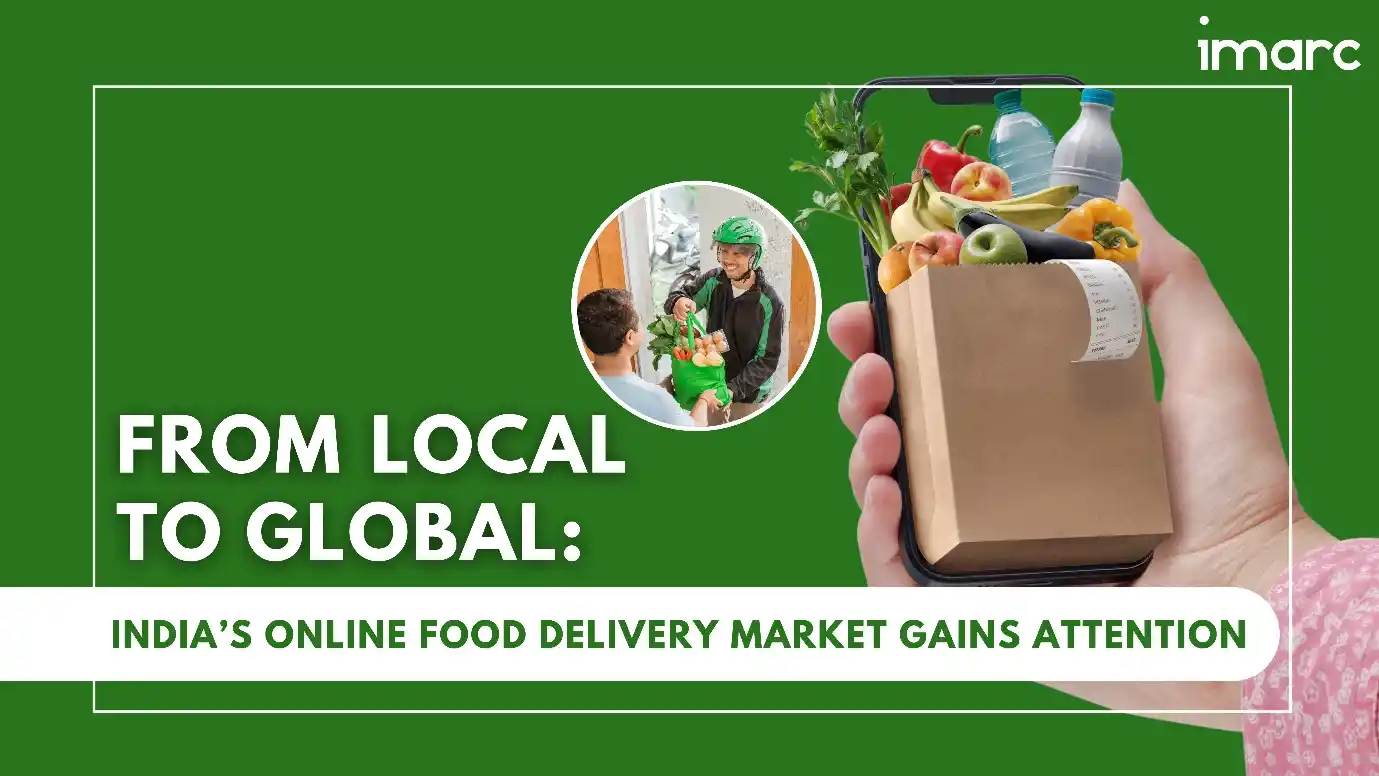From Local to Global: India’s Online Food Delivery Market Gains Attention

Over the recent decade, the online food and grocery delivery business in India has witnessed exponential growth. This expansion is attributed to the increasing penetration of smartphones, the affordability and convenience offered by food delivery app services, and the growing availability of low-cost internet services. The industry has become progressively competitive, with numerous local and international players competing for a significant market share. Nonetheless, despite the extreme competition, global players are continuing to make significant investments in India on account of its significant market share in the global online food delivery market.
India is witnessing a rise in investments, with the latest announcement of Swiggy’s most awaited initial public offering (IPO) generating significant interest from top-tier international investors. Swiggy, a SoftBank-backed leading Indian food and grocery delivery service provider, recently launched its USD 1.35 Billion IPO, which is the country's second-biggest stock offering of 2024 after Hyundai Motor India. Major investors such as Norway's sovereign wealth fund Norges and Fidelity placed bids worth more than USD 15 Billion in the IPO, which is over 25 times the USD 605 million chunk reserved for these investors.
Swiggy’s IPO: A Testimony to the Increasing Investor Interest
The growing interest of investors in India's food delivery and quick commerce sector highlights the robust investor appetite for contributing to the Indian market space. Other major investors such as BlackRock, Capital Group, Canada Pension Plan Investment Board, New World Fund, Omnis Portfolio Investments, Nomura, Government Pension Fund Global, PGGM World Equity, Carmignac, Eastspring Investments, Citigroup, TOCU Europe, Integrated Core Strategies, CLSA, Matthews Asia Funds, and Societe Generale also invested in the company via anchor book. This avidness for Swiggy’s IPO comes despite a recent adjustment in its valuation (from an expected valuation of USD 15 Billion to the current USD 11.3 Billion). The massive capital influx illustrates the expanding potential of India’s flourishing online food delivery industry.
India’s Quick Commerce Surge in Online Food Delivery
The advent of quick commerce delivery services in India is a significant market trend revolutionizing the online food delivery industry dynamics. Swiggy, along with its key competitor Zomato, is spearheading the quick commerce revolution. This unconventional model promises to deliver not only groceries and food items but also other consumer goods, including electronics, within a span of a few minutes. As consumers demand quicker and more convenient delivery services, quick commerce is all set to disrupt the traditional models of retail.
Swiggy’s bid to appeal to large-scale investments also indicates the significant interest in India’s quick commerce space, where companies offer ultra-fast delivery of consumer items. This paradigm shift is part of an emerging trend in India’s retail market that has witnessed an increase in demand for speediness and convenience in delivery services.
Other Key Trends in the Market:
- Adoption of Innovative Technologies: Several platforms are adopting advanced technology to enhance the overall customer experience. Virtual assistants and chatbots driven by AI are being implemented to manage the queries of consumers and streamline the ordering process by providing suggestions and solutions to the questions of the customers. This makes the user experience more efficient and convenient. Data analytics is adopted to identify the preferences and behavior of consumers to offer customized recommendations, discounts, and promotions. Automated features, including order tracking, real-time updates on the status of orders, and contactless delivery options, have further enhanced customer satisfaction while catering to health and safety concerns.

- Hyperlocal Delivery Networks: Hyperlocal expansion of delivery services has been one of the significant trends in the online food delivery market. Platforms are focusing on serving specific localities within cities to expedite the delivery turnaround time and enhance operational efficiency and customer satisfaction. Setting up dedicated distribution hubs in different localities helps in quicker food deliveries. It also enables platforms to offer a broad variety of options according to the local food choices. In addition, these platforms are incorporating technologies, including data analytics and machine learning, that help the companies recognize demand patterns, customize the offerings at a local level, and improve delivery routes, resulting in a broader food choice for the customers as per their location as well as faster deliveries.

- Sustainability: Sustainability has become a crucial factor to consider for every business, driven by increasing environmental concerns. Platforms are now adopting eco-friendly methods, including the use of biodegradable packaging, reduction in the usage of single-use plastic, and campaigns for responsible waste disposal. Some platforms also offer incentives for preferring sustainable delivery options where deliveries are made with the help of electric vehicles instead of conventional vehicles. Zomato, for instance, has joined The Climate Group’s EV100 initiative and is committed to accomplishing 100% EV deliveries by 2030.

What Makes India a Lucrative Market?
One of the major reasons why international players are attracted to the Indian market is the sheer size of the market. India has a population of over 1.4 Billion people, and the online food delivery market in India was valued at USD 36.3 Billion in 2023, according to a report by IMARC Group. This presents immense potential for food delivery companies to capitalize on. Further, India's growing middle-class population, paired with the increasing adoption of smartphones and internet connectivity, is opportunistic for businesses and investors.
One of the key trends expanding the market potential of India is the increasing demand for healthy and organic food. Numerous players in the market are now offering healthy food options and are also collaborating with local farmers and suppliers to source organic ingredients. Furthermore, players such as Swiggy and Dunzo, among others, now offer hyperlocal delivery services, where consumers can order groceries, medicines, and other essential items and get them delivered in a short time frame. This trend is expected to open new growth avenues for the industry, thereby attracting significant investments over the upcoming years.
Competitive Scenario:
In the immensely competitive online delivery landscape, Swiggy is competing with other major players, such as Zomato, Faasos, Deliveroo, Grubhub, and Eat Fit, among others. Zomato, Swiggy’s key competitor, went public in 2021 and continues to appeal to investors interested in India’s rapidly growing digital economy.
For Swiggy, its IPO not only exhibits a remarkable milestone but also a chance to harness new capital to scale its infrastructure and technology to better serve India with faster and more efficient delivery services. With significant financial support and increased competition, India’s online food and quick-commerce sectors are poised for tremendous growth, redefining consumer expectations and positioning India as a foremost hub for innovation in e-commerce and delivery logistics services.
The Road Ahead:
The digital revolution in India has supported the online food delivery market to grow at a rapid pace, with government initiatives, including Digital India and the rise of the Unified Payments Interface (UPI), being major catalysts. In addition, to balance the domination of the food delivery aggregators, the Department for Promotion of Industry and Internal Trade (DPIIT) has commenced the Open Network for Digital Commerce (ONDC) platform. This platform is aimed at providing a growth opportunity for restaurants to directly reach customers while avoiding the expensive commissions charged by aggregators. Payments also occur directly between customers and restaurants, thus avoiding the intermediaries.
The demand for online food delivery services is expected to be driven by tier 2 and tier 3 cities with the rapid expansion of internet and smartphone penetration. The growing population of young professionals and students in urban areas, as well as tier 2 and tier 3 cities, are the primary target audiences for online food delivery platforms due to their demand for convenience, quick food delivery, and high disposable income. Emerging technologies such as drone delivery are expected to further enhance operational efficiency and augment customer experience in the future.
Your Business Can Capitalize on This Opportunity Too:
IMARC has a wide-ranging suite of services to support businesses looking to leverage the potential of the online food delivery market. Our proficient analysts provide businesses with in-depth market research, including competitive analysis, industry trends, and consumer behavior study, for gaining a thorough understanding of the market dynamics and identification of emerging opportunities. We conduct comprehensive feasibility studies to assess the risks and profitability associated with your investments in the industry.
We help develop personalized market entry strategies, including target market identification, selection of distribution channels, and managing regional operations for quick delivery. Further, we can help your business align with the regional laws and regulations related to food consumption and packaging and gain a clear picture of the intricate regulatory landscape of the target countries. By partnering with IMARC, businesses can attain a competitive edge and devise profitable strategies to capitalize on the remarkable growth potential of the industry.
Our Clients
Contact Us
Have a question or need assistance?
Please complete the form with your inquiry or reach out to us at
Phone Number
+91-120-433-0800+1-201-971-6302
+44-753-714-6104










